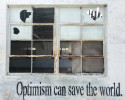
My wife and I were having a perfectly lovely time. We were situated in a corner booth at Egg Haven, one of my home town’s more popular eateries, as our waitress whirled through the room with an energy level that seemed impossibly high for a Sunday morning.
We were engaged in an activity long time married couples rarely do. We talked to each other. Face to face, too. I mean, we really talked. Ideas were exchanged, dreams were fleshed out, concerns were aired, and disagreements were but a minor inconvenience.
All in all, things were good. Then my eye wandered away from the restaurant to an abandoned building across the street that has, to be kind, seen better days. There, below a window with 16 panes, only three of which were still intact, were the words, “Optimism can save the world.”
Think about that for a moment, if you will.
The sentence was neatly stenciled. Proper capitalization was in evidence, as evidenced by an upper-case “O.” The artist had even used proper punctuation, adding a period to the end of his or her thought to signify the completion of an idea. Clearly, great care had been taken to express an idea.
However, I don’t suppose the individual who put it there took much time to explore the depths of their psyche in a search that reached beyond the overt feel-good nature of the line. If they had, they might have realized that as a standalone thought, it’s drivel.
Let’s do a thought experiment. And for those unused to the 21st Century, “thought experiment” is an increasingly popular euphemism for “consider this.”
Let’s say we’re at sea in a small boat. For the sake of argument, let’s say the boat is primarily built of steel. The coastline is only slightly over the horizon. Close enough to be tempting, yet far enough away that even a reasonably strong swimmer couldn’t cover the distance. Now let’s say our boat springs a leak. A big leak. Salt water is gushing in, filling our hull at an alarming rate. The almost magical property of displacement that was so effectively keeping our little boat afloat is now working against us. In a matter of minutes the boat will sink, leaving the inhabitants of the boat, you and me, floundering in choppy seas. The water is terribly cold, too. It is late October, after all.
Now just how optimistic would one have to be for the laws of physics to be reversed, allowing our violated hull to stay afloat? What amount of good humor might prevent our body temperature from plunging toward a dangerous chill? How happy would we have to be in order to stay alive until somebody, somewhere, happens upon us and facilitates a rescue?
Were I in that situation with you — and let’s hope we never are — I would be very pleased to find you being optimistic and resourceful. If you were to pull a raft from a storage compartment and inflate it, attach a personal locator beacon to your life jacket, and assure me that a Coast Guard vessel would be zipping to our rescue in minutes…well, I just might feel a whole lot more hopeful about my short-term future.
But that confidence wouldn’t be a result of your optimism, it would be thanks to your resourcefulness and the fact that you were taking positive steps to make a change in our condition.
Optimism cannot save the world, but it’s a tremendously valuable tool. I certainly wouldn’t want to be without it.
Bumper sticker politics surround us. They invade the landscape and the airwaves, pelting us with ideas so appealingly simple we sometimes don’t stop to consider exactly how shallow and incomplete those ideas may be.
The problem with slogan-driven campaigns is closely linked to their frequent use and occasional success. They misrepresent complex issues. They lack nuance and context.
But like a big fluffy stack of pancakes on a Sunday morning, they look good — at least on the surface.
Let’s face it, they’re appealing on a basic level. But if you gobble up those pancakes on a regular basis you’ll find yourself facing long-term problems that are far less attractive than those light, delectable cakes might have led you to think possible. The same can be said for the risk of swallowing slogans whole.
The world we live in is populated by more than 7 billion people, living on seven continents, speaking more than 6,000 languages, and participating in more than 4,000 religions. The collective troubles that come with those numbers cannot be solved by simply thinking positive thoughts.
Nor can the issues facing your town, city, county, or state be magically fixed by your enthusiastic embrace of a single party, or candidate, or issue. Life is more complex than that.
Optimism alone isn’t the solution and bumper sticker politics often do more harm than good, even though there is often a grain of truth somewhere in there.
So what will save the world, or solve any other problems you might face?
The sun came up this morning. A new day presents to you more opportunities than any previous generation could even imagine. If you’re reading this column, you may take comfort in knowing that you are among the wealthiest, healthiest, best-fed people to ever walk the earth. There is absolutely, without a doubt, a thousand reasons to be optimistic about today, tomorrow, and the future. You’ve got all that going for you. So do something.
Unfortunately, that’s a bit wordy for a bumper sticker.
Source: http://generalaviationnews.comBeware bumper sticker politics